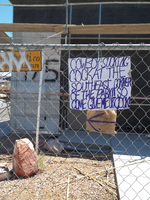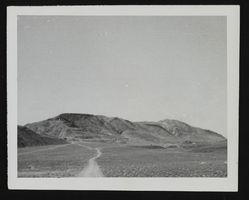Search the Special Collections and Archives Portal
Search Results

Rebuilding of Spotlight Lounge at new address and explicit sign on construction fence, 975 East Sahara Avenue in Commercial Center, Las Vegas, Nevada: digital image
Date
2012-07-26
Archival Collection
Description
From the Dennis McBride Photograph Collection (PH-00263) -- LGBTQ+ events and organizations in Las Vegas, Nevada -- Digital images file. Notes from the donor, Dennis McBride: The Spotlight Lounge opened in April 1998, then was sold in 2011. There followed a major rebuilding of the bar, which reopened in 2012. The address was changed from 957 to 975 East Sahara Avenue. … The obscene sign pictured here reads, "Cowboy sucking cock at the southeast corner of the park!! So come give me ur cock!"
Image

David Parks campaign sign, Pecos Road south of East Sunset Road, Las Vegas, Nevada: digital image
Date
2016-07-16
Archival Collection
Description
From the Dennis McBride Photograph Collection (PH-00263) -- LGBTQ+ events and organizations in Las Vegas, Nevada -- Digital images file. Notes from the donor, Dennis McBride: Democrat David Parks was elected to the Nevada State Assembly, 41st District, in 1996, where he termed out in 2008. He then served in the Nevada State Senate, 7th District, from 2008 until he termed out in 2020. This sign is from Parks' 2016 campaign for Nevada State Senate. Individuals identified by the donor, Dennis McBride: David Parks
Image

David Parks campaign sign, Pecos Road south of East Sunset Road, Las Vegas, Nevada: digital image
Date
2016-07-16
Archival Collection
Description
From the Dennis McBride Photograph Collection (PH-00263) -- LGBTQ+ events and organizations in Las Vegas, Nevada -- Digital images file. Notes from the donor, Dennis McBride: Democrat David Parks was elected to the Nevada State Assembly, 41st District, in 1996, where he termed out in 2008. He then served in the Nevada State Senate, 7th District, from 2008 until he termed out in 2020. This sign is from Parks' 2016 campaign for Nevada State Senate. Individuals identified by the donor, Dennis McBride: David Parks
Image

David Parks campaign sign, Pecos Road south of East Sunset Road, Las Vegas, Nevada: digital image
Date
2016-07-16
Archival Collection
Description
From the Dennis McBride Photograph Collection (PH-00263) -- LGBTQ+ events and organizations in Las Vegas, Nevada -- Digital images file. Notes from the donor, Dennis McBride: Democrat David Parks was elected to the Nevada State Assembly, 41st District, in 1996, where he termed out in 2008. He then served in the Nevada State Senate, 7th District, from 2008 until he termed out in 2020. This sign is from Parks' 2016 campaign for Nevada State Senate. Individuals identified by the donor, Dennis McBride: David Parks
Image

David Parks campaign sign, Pecos Road south of East Sunset Road, Las Vegas, Nevada: digital image
Date
2016-07-16
Archival Collection
Description
From the Dennis McBride Photograph Collection (PH-00263) -- LGBTQ+ events and organizations in Las Vegas, Nevada -- Digital images file. Notes from the donor, Dennis McBride: Democrat David Parks was elected to the Nevada State Assembly, 41st District, in 1996, where he termed out in 2008. He then served in the Nevada State Senate, 7th District, from 2008 until he termed out in 2020. This sign is from Parks' 2016 campaign for Nevada State Senate. Individuals identified by the donor, Dennis McBride: David Parks
Image

Rebuilding of Spotlight Lounge at new address and explicit sign on construction fence, 975 East Sahara Avenue in Commercial Center, Las Vegas, Nevada: digital image
Date
2012-07-26
Archival Collection
Description
From the Dennis McBride Photograph Collection (PH-00263) -- LGBTQ+ events and organizations in Las Vegas, Nevada -- Digital images file. Notes from the donor, Dennis McBride: The Spotlight Lounge opened in April 1998, then was sold in 2011. There followed a major rebuilding of the bar, which reopened in 2012. The address was changed from 957 to 975 East Sahara Avenue. … The obscene sign pictured here reads, "Cowboy sucking cock at the southeast corner of the park!! So come give me ur cock!"
Image

Rebuilding of Spotlight Lounge at new address and explicit sign on construction fence, 975 East Sahara Avenue in Commercial Center, Las Vegas, Nevada: digital image
Date
2012-07-26
Archival Collection
Description
From the Dennis McBride Photograph Collection (PH-00263) -- LGBTQ+ events and organizations in Las Vegas, Nevada -- Digital images file. Notes from the donor, Dennis McBride: The Spotlight Lounge opened in April 1998, then was sold in 2011. There followed a major rebuilding of the bar, which reopened in 2012. The address was changed from 957 to 975 East Sahara Avenue. … The obscene sign pictured here reads, "Cowboy sucking cock at the southeast corner of the park!! So come give me ur cock!"
Image
Recent car thefts at valet parking lots in Las Vegas: video
Date
2001-07-09
Archival Collection
Description
News report about car thefts connected to valet parking in Las Vegas, reported by Janine Gill; with introduction by news anchors Gary Waddell and Paula Francis. Gill's reported on specific car theft victim Marisha Apodaca, at 1:39 into video, whose valet-parked vehicle was stolen at The Beach nightclub in Las Vegas. Includes b-roll aerial view of The Paris Hotel valet parking and the Stardust Hotel valet parking. Also includes soundbite from Las Vegas Metro Police Sergeant Al Bechyne on the car theft issue, and Pat Hanley of The Stardust Valet Parking detail. Original media VHS, color, aspect ratio 4 x 3, frame size 720 x 486. From the Stardust Resort and Casino Records (MS-00515) -- Photographs and audiovisual material -- Digitized audiovisual material file.
Moving Image

Remains of Princess Mill foundations, Candelaria, Nevada: photographic print
Date
1983-01-24
Description
From the Nan Doughty Photograph Collection (PH-00240)
Image

View of northern Belle Hill and Candelaria, Nevada: photographic print
Date
1983-03-18
Description
From the Nan Doughty Photograph Collection (PH-00240)
Image
Pagination
Refine my results
Content Type
Creator or Contributor
Subject
Archival Collection
Digital Project
Resource Type
Year
Material Type
Place
Language
Records Classification
